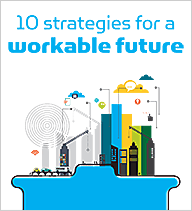Future Now
The IFTF Blog
New Release! 10 Strategies for a Workable Future
INSTITUTE FOR THE FUTURE RELEASES “TEN STRATEGIES FOR A WORKABLE FUTURE” DURING WEEK OF D.C. DISCUSSIONS ON FUTURE OF WORK
Ten strategies outlined as an agenda for immediate action for policy makers, platform developers, labor and educational organizations
 An urgent public dialogue is unfolding about the state of the US workforce and its prospects for the next decade as a result of changing labor dynamics, growth of on-demand workers, and erosion of middle class wages and access to benefits. To support those conversations and to set an agenda for 2016 and beyond, IFTF's Workable Futures Initiative, has created a new report: 10 Strategies for a Workable Future.
An urgent public dialogue is unfolding about the state of the US workforce and its prospects for the next decade as a result of changing labor dynamics, growth of on-demand workers, and erosion of middle class wages and access to benefits. To support those conversations and to set an agenda for 2016 and beyond, IFTF's Workable Futures Initiative, has created a new report: 10 Strategies for a Workable Future.
This new report draws from 40 years of research on the future of work and technology and builds on IFTF’s latest ethnography, workshops, and forecasts. The ten strategies were synthesized after a Workable Futures Initiative convening in October of over 70 well-known thought leaders, technologists, and social inventors.
The launch of the report coincides with a week of events and conversations in Washington, D.C., including the U.S. Department of Labor Future of Work Symposium, where IFTF Executive Director Marina Gorbis and 2015 IFTF Fellow Natalie Foster will both be speaking, and the Future of Working and Learning Policy Forum hosted by the ACT Foundation. According to Gorbis, the time is now to shape how things will play out during the coming decade.
“All the stakeholders are finally talking,” Gorbis says. “But often their conversations are centered on ‘turf and power’ debates focused on the short term. There is an unprecedented opportunity now, while we are all in dialogue together, to collaborate to make a truly workable future.”
The ten strategies included in the report chart an agenda for platform designers and policymakers alike:
1. Combine the best of investor-owned and commons-based platform models
In their position as leading edge innovators, platform designers can discover and prototype new options along the market to commons continuum, but can social inventors also create the market and policy environments where these prototypes can take root?
2. Solve for both transparency and privacy
Positive platforms have the potential to inject much greater intelligence into our global economy with transparency, but how will they balance that transparency with privacy?
3. Integrate marginalized workers in a sustainable economy
Positive platforms can help reclassify jobs, revalue them to reflect their true social value, and make sure everyone has access, but how can labor policy and communications policy alike support this reinvention of work at the margins?
4. Ensure opportunities for workers to advance outside of traditional organizational hierarchies
We are shifting from organizationally-driven career paths to more fluid work patterns in which people work across multiple platforms and teams, often performing different roles and building complex work portfolios. How can positive platforms help workers make choices and invest in personal brand-building in a way that enhances the capacity of the human workforce?
5. Support worker-owned identities
Positive platforms can support workers in managing their distributed identities to their own advantage, but how do we assure that workers know how to make the most of their data to build and share prosperous identities?
6. Create ways for workers to bring their voices together
Positive platforms can intentionally create ways for workers to bring their voices together, but can such platforms help workers gain the power to get employers and power brokers to say YES when they want to say NO?
7. Reinvent benefits to follow workers everywhere
Portable benefits have been suggested as a flexible solution to support flexible workers, and positive platforms can create the economies of scale and cross-boundary reach that such benefits require. But how will these benefits be designed and accessed in a mobile global workforce—and what role can positive platforms play in their successful deployment?
8. Integrate learning and work
Positive platforms could turn learning into earning, and pay learners to do real-world tasks as they learn. But how will we rethink work tasks as learning tasks and vice versa to create these virtuous cycles of learning and earning?
9. Prepare youth for “the hustle”
Positive platforms can help young people safely prepare for the rough and tumble world of the platform economy and entrepreneurial innovation, but how will we shift the measures of academic success to gauge the readiness of students to participant in an emergent, on-demand labor economy?
10. Champion a good work code
Positive platforms and protocols can set the trajectory for worker well-being by designing software and processes to meet a code of good work, but how will we champion these basic principles across a diverse worker ecosystem and operationalize them in the next all-important decade?
In 2016, IFTF will expand its Workable Futures Initiative through continued ethnographic research, studies of the labor economics of digital platforms, and a series of hackathons and convenings in an effort to prototype technological, social, and regulatory solutions using these 10 strategies.
More Information
![]() For more information about the IFTF Workable Futures Initiative contact Program Manager, Libby Reder. IFTF looks forward to continuing to be part of the dialogue in pursuit of a workable future for all.
For more information about the IFTF Workable Futures Initiative contact Program Manager, Libby Reder. IFTF looks forward to continuing to be part of the dialogue in pursuit of a workable future for all.



